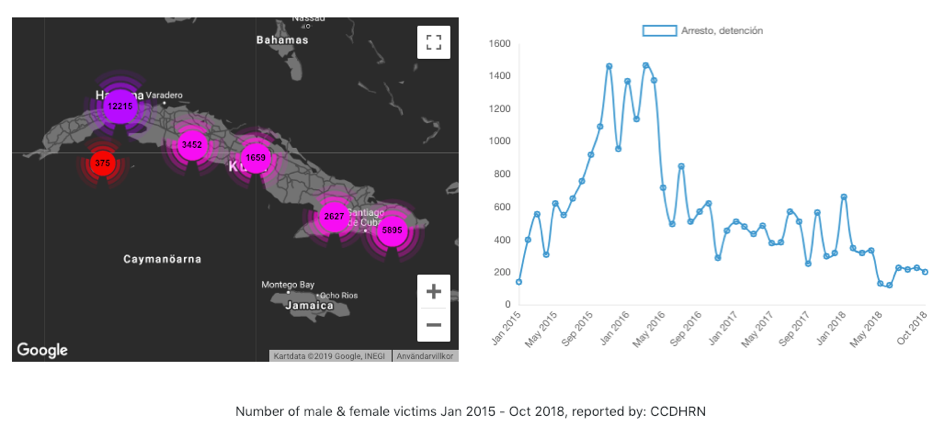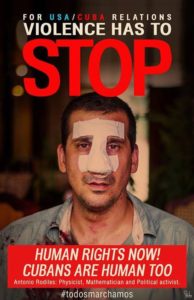
Credit: Civil Rights Defenders
The Cuban regime’s sympathizers – including those like Angela Davis who never protested Fidel Castro’s brutal anti-gay repressions – insist that the Communist stalwart may be moving closer to democracy, but more acute observers suggest that it is aiming to consolidate authoritarian rule in a different guise.
Cuba ‘s government has shown no interest in reforming the political system in a democratic direction and repression against human rights defenders has seriously deteriorated, according to Civil Rights Defenders, drawing on testimony from four of Cuba’s most renowned democracy  activists; Tania Bruguera, Manuel Cuesta Morúa, Rosa Maria Payá (below), and Antonio Rodiles (right):
activists; Tania Bruguera, Manuel Cuesta Morúa, Rosa Maria Payá (below), and Antonio Rodiles (right):
Entire organisations like Cubalex and Hablemos Press have been forced into exile, demonstrations in support of the liberation of political prisoners by Damas de Blanco (Ladies in White) and other organisations after mass on Sundays, have been completely suppressed. Every weekend, policemen wait outside their homes to arrest those trying to go to church.
For several years, the organisation UNPACU in Santiago on Eastern Cuba was able to gather hundreds of people for protests on Sundays. But when Civil Rights Defenders visited them a year ago, they stated that they could not even leave their homes without being persecuted and threatened.
The EU-Cuba trade agreement should not be ratified, as that would be interpreted as an approval of the Cuban government’s repression of civil and political rights, Civil Rights Defenders insists.
For many years the Organization of American States was a dictators’ club, where the rule was “you don’t criticize my human rights abuses and I won’t criticize yours.” And the secretaries-general of the organization went along with this, notes Council on Foreign Relations analyst Elliott Abrams.
 Happily those days are over, and the current secretary-general, Luis Almagro, a former foreign minister of Uruguay, has been a stalwart defender of human rights. At the beginning of this year he delivered a superb speech exposing the dictatorship in Cuba, and it is available on YouTube (in Spanish). Almagro pulled no punches; he told the brutal truth about the “Cuban revolution,” adds Abrams, a board member of the National Endowment for Democracy:
Happily those days are over, and the current secretary-general, Luis Almagro, a former foreign minister of Uruguay, has been a stalwart defender of human rights. At the beginning of this year he delivered a superb speech exposing the dictatorship in Cuba, and it is available on YouTube (in Spanish). Almagro pulled no punches; he told the brutal truth about the “Cuban revolution,” adds Abrams, a board member of the National Endowment for Democracy:
The dictatorship present in Cuba is probably the most perfect example of the mythology of misery and human rights violations. That the people of Cuba regain sovereignty is fundamental in a continent that should definitely not host dictatorships, crimes against humanity, or unsustainable social conditions for its people. The end of the dictatorship implies that the process of the revolution that introduced an unsuccessful system must give way to new opportunities for people to enjoy their rights, must give way so that people can be free, without total control of public and private life by a totalitarian and corrupt state.
The Cuban dictatorship has failed in access to rights and equity, its productive system has failed, its financial management has failed, its management of the economy has failed and the only way to melt away its social deficiencies is to push its people into exile; it is a system that is incapable of giving dignified and honest work to its people, that is unable to open its youth to enterprise, unable to generate a competitive productive system and unable to achieve solutions for the simplest financial issues such as the operation of a real exchange rate. RTWT







